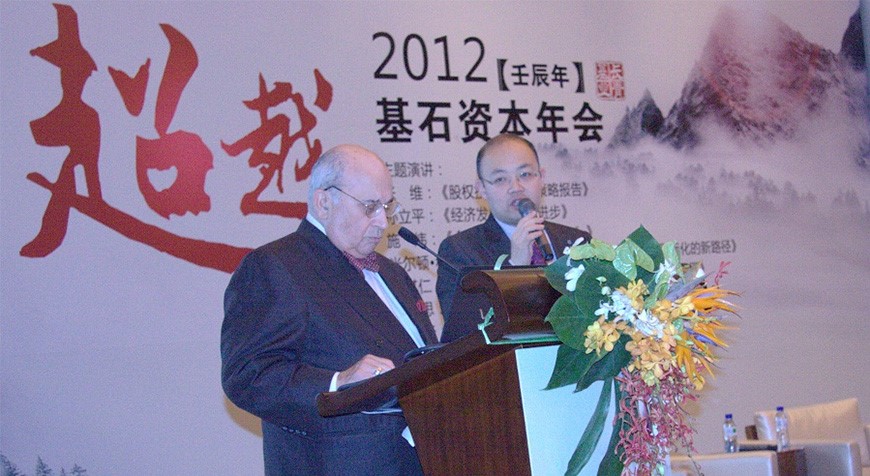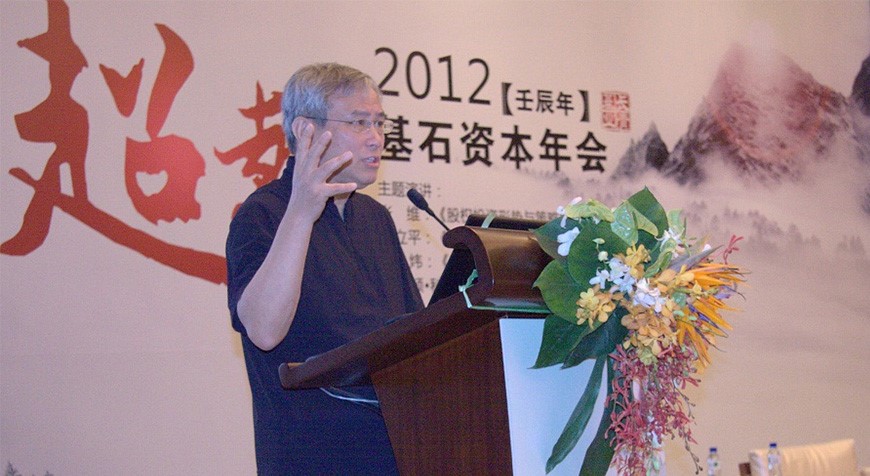2012.12.01 CoStone Capital 浏览次数:
CoStone Annual Meeting 2012 kicked off at MGM Grand Sanya, Hainan on March 23, with nearly 300 investors and entrepreneurs being present.
March 26, 2012

MGM Grand Sanya
The three-day annual meeting consists of performance reporting, Chairman Zhang Wei's keynote speech and lectures of experts in management.
On the first day, an investor conference for four funds managed by CoStone Capital including the Guangzhou Fund and the CoStone Everest Fund was held. In the conference, CoStone Capital reported to the investors on the performance of the funds and won high praise for the team's excellent expertise and risk control ability.
Zhang Wei made a speech on the Situation and Strategies of Equity Investment. He observed a decline in the returns of Pre-IPO investment. Against the backdrop, CoStone Capital is going to launch a late-stage VC fund investing in high-growth enterprises at the early stage, with a target of ¥600m (approx. $91m). CoStone Capital, as the fund manager, promises to commit to the fund at a high proportion, which reflects that it shares a great many common interests with the investors. As a result, moral hazards can be prevented and self-discipline strengthened, said Chairman Zhang.
The next two days witnessed the CoStone Master Forum.
Professor Sun Liping at Tsinghua University made a speech on the Economic Development & Social Progress. In his opinion, China needs a social progressive movement which enables the middle class to grow larger so as to stimulate the consumer demand for durable goods.
Professor Shi Wei at Renmin University of China lectured on the Enterprise Transformation and the Capacity Gap. He called on the enterprises to hire and cultivate more young people or graduates and to discover, stimulate and enhance the entrepreneurial capacity of a tiny fraction of them. Furthermore, enterprises should establish a long-term partnership with employees and foster a culture of common growth, added Prof. Shi.

Prof. Philip Kotler making a speech
Professor Philip Kotler, a world-famous marketing master, made a speech on Economic Woes in the US and Europe and New Opportunities Arising from the Internationalization of Chinese Enterprises. He advised Chinese enterprises to seek M&A opportunities with hidden champions in the American manufacturing sector for technological and brand upgrading.

Prof. Zhou Qiren making a speech on Market Base
Professor Zhou Qiren prioritized the issue of property rights in his speech. He believed that, to raised the income of farmers, the government should clarify and protect their property right rather than only offer subsidies and tax cuts.
Wu Si, a historian, analyzed the Chinese history since the Qin dynasty and proposed a new view of history for explaining the issues of public concern throughout the history.
Professor Peng Jianfeng, Chairman of China Stone Management Consulting Group, talked about the mechanism building and the practice of Midea. From his perspective, Midea's mechanism, which features high performance and the sharing spirit, has contributed to its success. In other words, Midea values the contribution of employees and shares benefits with them.
Professor Bao Zheng at Renmin University of China (RUC) shared his views of Chinese-style management. As he said, enterprises should aim for sharing benefits and the future with customers on the basis of satisfying their needs. Moreover, he emphasized that it is the manager who should be relied on to run the business and create a common belief for the enterprise.
Speaker
Prof. Sun Liping
Sun Liping is Professor and PhD Supervisor at the Department of Sociology, School of Social Sciences, Tsinghua University. His research focuses on social modernization, changes of social structure in China and sociology of transformation. He was named Person of the Year for Public Interests by South Reviews in 2006.
Prof. Shi Wei
Shi Wei is a researcher and Chief Consultant at the Finance and Securities Institute of RUC. He has been engaged in enterprise management consulting since 1995, specializing in marketing and enterprise strategy. He has served TCL, Midea Group, Giti Tire, Motorola, Liuhe Group, Robust Group, CIMC, Telling Telecom and SPD Bank. He also provides management trainings for many enterprises in China, which have been well received.
Prof. Philip Kotler
Philip Kotler is Professor Emeritus of Marketing at the Kellogg School of Management, where he held the S.C. Johnson & Son Professorship of International Marketing. He received his master's degree from the University of Chicago and his PhD from MIT, both in Economics. He did post-doctoral work in Mathematics at Harvard University and in behavioral science at the University of Chicago. Prof. Kotler has consulted for such companies as IBM, General Electric, AT&T, Honeywell, Bank of America, Merck and others in the areas of marketing strategy and planning, marketing organization and international marketing. He has been Chairman of the College of Marketing of the Institute of Management Sciences, Director of the American Marketing Association, Trustee of the Marketing Science Institute, Director of the MAC Group, a former member of the Yankelovich Advisory Board, and a member of the Copernicus Advisory Board. He is Member of the Board of Governors of the School of the Art Institute of Chicago and Member of the Advisory Board of the Drucker Foundation.
Prof. Zhou Qiren
Zhou Qiren, a famous economist, is Professor of Economics and Former Dean of National School of Development at Peking University. He received his PhD degree from the University of California Los Angeles (UCLA). He served as a member of the Monetary Policy Committee of the People's Bank of China during 2010-2012. He is a member of the Expert Committee of National Development Planning for the 13th and 14th Five Year Plan, Member of Shanghai Decision-making Advisory Committee, and Member of Entrepreneur Advisory Meeting of Hainan Provincial Government. His research focuses on property rights and contracts, firms and market Organization, monetary and exchange rate, and reform and innovation. He has been rated as the Most Popular Professor Among Students at Peking University since 1997.
Wu Si
Wu Si is a well-known writer, journalist and historian. In 1982, he graduated from the School of Liberal Arts, Renmin University of China and became Deputy Director of the Editorial Office of Farmers’ Daily. He served as Vice President and Editor-in-chief of the Chinese edition of The Bridge sponsored by the All-China Journalists' Association in 1993, and Vice President and Executive Editor of Chinese National Academy of Arts in 1996. His representative works include Chen Yonggui's Ups and Downs in Zhongnanhai: An Experiment with Changing China and Hiden Rules: True Games in Chinese History.
Prof. Peng Jianfeng
Peng Jianfeng is Professor and Supervisor at Renmin University of China, Chairman of China Stone Management Consulting Group, Deputy Director of China Enterprise Confederation Management Consulting Committee, Vice President of Beijing Enterprise Directors Association, and a famous management consulting expert in China. Prof. Peng used to be Vice President of the School of Labor and Human Resources of RUC. He has been engaged in the consulting and research work on HR management and corporate culture for a long time. He also provides consulting services for enterprises. He has been hired as a senior management consultant and a team leader by Huawei and TCL successively. The team led by him has consulted for dozens of famous enterprises, with the results of Huawei Basic Law, OCT Charter, TCL: Defeat Scale with Speed, Samsung (China) Culture and Dongfeng Nissan Programme of Action.
Prof. Bao Zheng
Prof. Bao Zheng received his PhD degree in Economics from Renmin University of China, and now is Professor and PhD Supervisor at Renmin Business School. He is a famous expert of enterprise management consulting in China, having created many famous cases, such as Huawei Basic Law and TCL: Defeat Scale with Speed. He has served as senior management consultant of Huawei (1995), TCL (1998), XJ Group (1999), Baisha Group (2002) and Hongta Group (2004).几年前,我曾提出一个问题:中国经济繁荣的根基是什么?
我认为是“重商主义(这里借指市场经济)”与“儒家文化”这两个因素的核聚变,只要我们的体制大门开一条小小的缝,中国老百姓与生俱来的聪明、勤奋、奋不顾身,几千年穷怕了的物质主义和实用主义,就能创造一个新天地。
2021年,我见到一个新能源公司的董事长,谈及张维迎所言“直到20世纪70年代,绝大部分中国人的生活水平不比唐宋时期好多少”,他说这是真的,1978年他没有见过电,全家所有家当是一个小木柜。1979年,我的好朋友,一个咨询集团的董事长考上了大学,报到前他勤工俭学,骑六七十里山路卖冰棍,山里的一户人家,用几个鸡蛋和他换了一根,全家人排成一排每个人吮吸一囗。
在改革开放前,这是中国普遍的景象。而我们这一两代人,在改革开放后,怀抱着对美好生活的向往,创造了人类发展史上的奇迹。40多年过去,我们看到,轻舟已过万重山。伟大的中国工业革命,怎么赞扬也不为过!
而另一方面,中国用几十年的时间,走完了发达国家几百年的路,这也就注定了,我们上山的道路,更加的陡峭。同时,中国作为一个有几千年历史的古国,其发展正常就是“孔雀东南飞,五里一徘徊”。作为一个新兴经济体,我们讲究的是实用主义,中国的政策也是因时、因势而变的。
因此,并非一些简单的因素就能够遏制中国的增长,只要不出现战争这样会扰乱经济进程的极端因素,只要中国依然坚定地支持民营经济发展,保护企业家精神,中国经济的前进步伐就是坚定不移的。
如果认同这一点,那么无论是短期的政策、市场变化还是长期的中美对抗,都不会让我们产生太大的焦虑。
具体从我们做企业和做投资来讲,也无需过度悲观。“沉舟侧畔千帆过,病树前头万木春”,在一些行业和企业衰落的同时,也永远有一些行业和企业在崛起。
以半导体产业为例,我们不必纠结于半导体仿佛一年紧缺、一年过剩,因为问题的核心不是这个。问题的核心是第四次工业革命离不开半导体技术,而中美对峙、科技封锁,将进一步迫使中国在所有科技领域谋求自主可控,进一步迫使中国以举国体制解决创新问题。同时,当一项投资吻合科技进步趋势和政策引导的双重影响时,其估值亦将脱离传统财务模型。这些才是中国硬科技投资的重要的底层逻辑。
看待资本市场,我们更不必计较一时的股价波动。回顾历史,在资本市场发生剧烈调整时,那些优质的企业往往也会出现大幅下跌,但不同的是,优秀企业不仅能收复失地,还能再攀高峰。因此,我们继续坚定地布局那些有核心技术、有企业家精神的企业。而从我们的投资经历来看,那些有企业家精神的企业最终都带领我们穿越了周期,并获得了异乎寻常的回报。
莫愁前路无知己,天下谁人不识君!